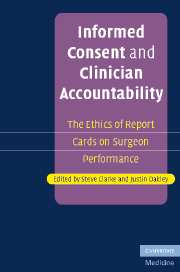Book contents
- Frontmatter
- Contents
- List of contributors
- Acknowledgements
- Introduction: Accountability, informed consent and clinician performance information
- Part I Accountability
- Part II Informed consent
- Part III Reporting performance information
- Part introduction
- 13 Is the reporting of an individual surgeon's clinical performance doing more harm than good for patient care?
- 14 Examining the link between publicly reporting healthcare quality and quality improvement
- 15 Hospital and clinician performance data: what it can and cannot tell us
- 16 An ethical analysis of the defensive surgery objection to individual surgeon report cards
- 17 Surgeon report cards and the concept of defensive medicine
- 18 Training, innovation and surgeons' report cards
- 19 Doctors' report cards: a legal perspective
- Index
- References
17 - Surgeon report cards and the concept of defensive medicine
Published online by Cambridge University Press: 08 August 2009
- Frontmatter
- Contents
- List of contributors
- Acknowledgements
- Introduction: Accountability, informed consent and clinician performance information
- Part I Accountability
- Part II Informed consent
- Part III Reporting performance information
- Part introduction
- 13 Is the reporting of an individual surgeon's clinical performance doing more harm than good for patient care?
- 14 Examining the link between publicly reporting healthcare quality and quality improvement
- 15 Hospital and clinician performance data: what it can and cannot tell us
- 16 An ethical analysis of the defensive surgery objection to individual surgeon report cards
- 17 Surgeon report cards and the concept of defensive medicine
- 18 Training, innovation and surgeons' report cards
- 19 Doctors' report cards: a legal perspective
- Index
- References
Summary
Introduction
The performance records of cardiac surgeons have been disclosed publicly in several states in the USA, for example New York and Pennsylvania, since the early 1990s. In response to the growing interest in the quality of healthcare, such records have also begun to be disclosed in the UK, starting in 2004. Various studies seem to show that disclosure has, indeed, contributed to the improvement of the quality of healthcare. However, at the same time, disclosure does have its critics.
In this paper, I discuss what I call the ‘defensive medicine objection’ to the disclosure of performance data; that disclosure is not justified because it could cause surgeons to experience high levels of anxiety, which might eventually lead to the practice of defensive medicine. Although this objection is often mentioned by ethicists and medical professionals, it has never been carefully analysed or evaluated. The aim of this chapter is to consider it in detail. I argue in favour of the objection; disclosure could, indeed, lead to the practice of defensive medicine if it is not conducted properly.
Surgeons' anxiety
There are two main arguments for justifying the disclosure of performance data. According to the first, which might be called the ‘rights-based argument’, patients have the right to know the skill of their surgeons. This argument seems to be underpinned by the doctrine of informed consent, which aims mainly at protecting patients' right to autonomy.
- Type
- Chapter
- Information
- Informed Consent and Clinician AccountabilityThe Ethics of Report Cards on Surgeon Performance, pp. 255 - 265Publisher: Cambridge University PressPrint publication year: 2007



